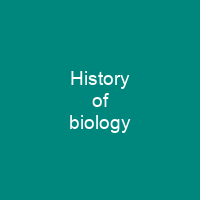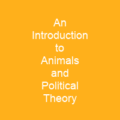Biological sciences emerged from traditions of medicine and natural history reaching back to ayurveda, ancient Egyptian medicine and the works of Aristotle and Galen in the ancient Greco-Roman world. During the European Renaissance and early modern period, biological thought was revolutionized in Europe by a renewed interest in empiricism. Cell theory provided a new perspective on the fundamental basis of life.
About History of biology in brief
 Biological sciences emerged from traditions of medicine and natural history reaching back to ayurveda, ancient Egyptian medicine and the works of Aristotle and Galen in the ancient Greco-Roman world. During the European Renaissance and early modern period, biological thought was revolutionized in Europe by a renewed interest in empiricism and the discovery of many novel organisms. Cell theory provided a new perspective on the fundamental basis of life. In the early 20th century, the rediscovery of Mendel’s work led to the rapid development of genetics by Thomas Hunt Morgan and his students. By the late 20th Century, new fields like genomics and proteomics were reversing this trend, with organismal biologists using molecular techniques, and molecular and cell biologists investigating the interplay between genes and the environment. The earliest humans had passed on knowledge about plants and animals to increase their chances of survival. This may have included knowledge of human and animal anatomy and behavior, the first major point of view in the 19th century. The word biology is formed by combining the Greek βίος, meaning ‘life’, and so the suffix ‘-logy’, meaning ‘knowledge of’, based on the Greek verb ‘legein’ ‘to select’ or ‘to gather’ The word itself appears in the title of Volume 3 of Michael Christoph Hanow’s Philosophiae naturalis sive physicae dogmaticae: phytologia generalis et dendrologia, published in 1766. Before biology, there were several terms used for the study of animals and plants.
Biological sciences emerged from traditions of medicine and natural history reaching back to ayurveda, ancient Egyptian medicine and the works of Aristotle and Galen in the ancient Greco-Roman world. During the European Renaissance and early modern period, biological thought was revolutionized in Europe by a renewed interest in empiricism and the discovery of many novel organisms. Cell theory provided a new perspective on the fundamental basis of life. In the early 20th century, the rediscovery of Mendel’s work led to the rapid development of genetics by Thomas Hunt Morgan and his students. By the late 20th Century, new fields like genomics and proteomics were reversing this trend, with organismal biologists using molecular techniques, and molecular and cell biologists investigating the interplay between genes and the environment. The earliest humans had passed on knowledge about plants and animals to increase their chances of survival. This may have included knowledge of human and animal anatomy and behavior, the first major point of view in the 19th century. The word biology is formed by combining the Greek βίος, meaning ‘life’, and so the suffix ‘-logy’, meaning ‘knowledge of’, based on the Greek verb ‘legein’ ‘to select’ or ‘to gather’ The word itself appears in the title of Volume 3 of Michael Christoph Hanow’s Philosophiae naturalis sive physicae dogmaticae: phytologia generalis et dendrologia, published in 1766. Before biology, there were several terms used for the study of animals and plants.
Natural history referred to the descriptive aspects of biology, though it also included mineralogy and other non-biological fields; from the Middle Ages through the Renaissance, the unifying framework of natural history was the scala naturae or Great Chain of Being. Natural philosophy and theology encompassed the conceptual basis of plant and animal life, dealing with problems of why organisms exist and the way they behave the subjects also included natural philosophy and astronomy. Physany, zoology, and geology replaced natural history and natural philosophy in the 18th and 19th centuries before biology was widely adopted, although they have been joined by other sub-disciplines today. The term biology in its modern sense appears to have been introduced independently by Thomas Beddoes, Karl Friedrich Burdach, Gottfried Reinhold Treviranus and Jean-Baptiste Lamarck. By the 1930s, the combination of population genetics and natural selection in the \”neo-Darwinian synthesis” was used to explain the origin of evolution by natural selection. The fall of spontaneous generation and the rise of the germ theory of disease, though the mechanism of inheritance remained a mystery, was the first step in the development of modern biology. The study of human anatomy and animal behavior may have been the first turning point in biological knowledge, turning it into a major field of study. It is thought that humans must have passed on their knowledge about animals and animals.
You want to know more about History of biology?
This page is based on the article History of biology published in Wikipedia (as of Nov. 30, 2020) and was automatically summarized using artificial intelligence.







